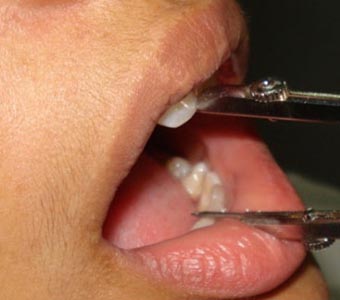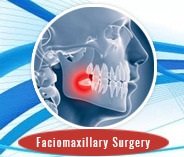Reduced or limited mouth opening is a common clinical problem and many individuals experience it at least once in his or her life and most dental specialists see patients with restricted mouth opening quite often. It can occur due to a variety of underlying conditions which may involve complex factors. Hence, it is essential for the dental specialist to thoroughly investigate and examine these cases for proper diagnosis and its appropriate management.
Trismus is a more difficult TMJ symptom to diagnose accurately. In healthy individuals mouth opening is around 30-50mm. But when the mouth opening is limited to a maximum of 20mm the individual is said to have a reduced mouth opening or Trismus. This can also be called “Lock Jaw”. This limitation in the ability to open the mouth can have serious health implications, including reduced nutrition due to impaired mastication, difficulty in speaking, and compromised oral hygiene. In persons who have received radiation to the head and neck, the condition is often observed in conjunction with difficulty in swallowing.

Symptoms of trismus
The most obvious effect of trismus is difficulty in opening the mouth. In cancer patients this frequently results from scar tissue from radiation or surgery, nerve damage, or a combination of factors. In stroke patients, the general cause is central nervous system dysfunction. Difficulty in speech and swallowing often accompany the limitation in mouth opening, and create a combination of symptoms that may be difficult to treat.
In cases of trismus caused by radiation treatment, patients also frequently present with Xerostomia, mucositis, and pain as a result of radiation burns. There may also be associated symptoms such as headache, jaw pain, ear ache, deafness, or pain on moving the jaw. In cases of temporomandibular joint disorders like tightness, the joint itself may become fibrotic, or even (in rare cases) ankylosed. Each of these factors may affect the treatment provided to the patient.
Causes of Trismus
It includes the inflammation along with a swelling of the gums. It mainly occurs in the third molars which are impacted. There can be inflammation of the muscles which help in eating. It occurs when the third molars are removed surgically. The condition heals within a week or two. At this stage the person cannot eat properly and cannot maintain hygiene. It can also occur due to the peritonsillar abscess in which there is a formation of the pus near the tonsils. This leads to sore throat, fever along with a problem in eating. Trismus is also linked with the sub mucous fibrosis. It is one of the most common side effects of few drugs like mephedrone. There are few Temporomandibular joint problems and the use of few stimulants such as amphetamine. There are other causes also such as the fusion of bones with the help of fibres or bones. There is a fracture of the condyle of Temporomandibular joint. There is an infection, gauchers disease and the use of local anaesthesia. In the gauchers disease there is a deficiency of the enzyme gluco cereberosidase. It can occur due to the fracture of condyle or trauma. The other reasons can be tetanus, malaria and malignant hyperthermia. It can also occur due to malaria and a problem in the ear. The other reason could be the formation of abscess. The use of neuroleptic drugs and infection is the other reason.
Treatment for TMJ
Treatment for limited jaw opening requires treating the underlying condition with TMJ dental treatments, physical therapy, and passive range of motion devices. Additionally, control of symptoms with pain medications (NSAIDs), muscle relaxants, and warm compresses may be used.
Prevention of Trismus
It includes the avoidance of any irritating factor. One must avoid alcohol, tobacco and cigarette smoking.















